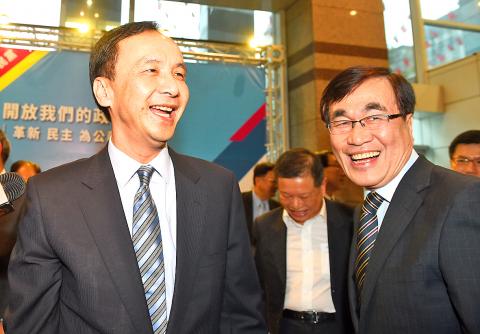Chinese Nationalist Party (KMT) Chairman Eric Chu’s (朱立倫) description of cross-strait relations as two sides “belonging to one China” risked leading to a “misunderstanding” that Taiwan belongs to the People’s Republic of China (PRC), Mainland Affairs Council Minister Andrew Hsia (夏立言) said in Taipei yesterday.
There is a subtle difference between that description and the so-called “1992 consensus” adopted by the government, under which both sides of the Taiwan Strait recognize that there is ‘“one China,” with each side having its own interpretation of what “China” means, Hsia told a meeting of the legislature’s Internal Administration Committee in Taipei.
The government has tried to avoid using the language Chu used because of political sensitivities and has opposed the formula whenever the Chinese mention it, Hsia said.

Photo: Chien Jung-fong, Taipei Times
“We consider it unacceptable. That position remains unchanged,” he said. “We would not choose to use of words he [Chu] did.”
However, Hsia commended Chu’s characterization of the “1992 consensus,” saying that Chu intended to highlight the importance of the consensus — although he used a different way to express it.
“If the ‘one China’ he [Chu] meant was the Republic of China [ROC], as he said it was, of course I am not opposed to the idea,” Hsia said.
Hsia was invited to the meeting to take legislators’ questions over Chu’s just-concluded trip to China, where he met Chinese President Xi Jinping (習近平) and attended the 10th Cross-Strait Economic, Trade and Culture Forum cohosted by the KMT and the Chinese Communist Party (CCP).
Chu’s statement that “both sides [of the Taiwan Strait] belong to ‘one China,’ with differences in connotations and definitions [of ‘one China’]” was at the center of the sometimes heated debate.
Hsia did not voice his opinion about Chu’s definition of the “1992 consensus” until he was grilled by legislators from the Democratic Progressive Party (DPP), the Taiwan Solidarity Union and the People First Party — one after another — about whether the government had shifted its position from the “1992 consensus,” or what it said was “one China, with each side having its own interpretation of what ‘China’ means” to “both sides belonging to ‘one China.’”
In the beginning, Hsia said the phrasing of “both sides belonging to ‘one China,’” was similar to the “1992 consensus” of “one China, with each side having its own interpretation of what ‘China’ means.”
Hsia said Chu was the first person in the ROC to describe cross-strait relations as being “two sides belonging to one China,” a term coined by Beijing and commonly used by Chinese officials — most recently by Xi in March.
He was then corrected by DPP Legislator Lee Chun-yi (李俊俋), who said former KMT chairmen Wu Poh-hsiung (吳伯雄) and Lien Chan (連戰) had both proposed the idea before.
The statement made by former Mainland Affairs Council minister Wang Yu-chi (王郁琦) in March 2013, in response to then-Chinese vice premier Li Keqiang (李克強), who said both sides belong to “one China,” that the characterization was “unacceptable” remains valid, Hsia said.

NATIONAL SECURITY THREAT: An official said that Guan Guan’s comments had gone beyond the threshold of free speech, as she advocated for the destruction of the ROC China-born media influencer Guan Guan’s (關關) residency permit has been revoked for repeatedly posting pro-China content that threatens national security, the National Immigration Agency said yesterday. Guan Guan has said many controversial things in her videos posted to Douyin (抖音), including “the red flag will soon be painted all over Taiwan” and “Taiwan is an inseparable part of China,” while expressing hope for expedited “reunification.” The agency received multiple reports alleging that Guan Guan had advocated for armed reunification last year. After investigating, the agency last month issued a notice requiring her to appear and account for her actions. Guan Guan appeared as required,

Japan and the Philippines yesterday signed a defense pact that would allow the tax-free provision of ammunition, fuel, food and other necessities when their forces stage joint training to boost deterrence against China’s growing aggression in the region and to bolster their preparation for natural disasters. Japan has faced increasing political, trade and security tensions with China, which was angered by Japanese Prime Minister Sanae Takaichi’s remark that a Chinese attack on Taiwan would be a survival-threatening situation for Japan, triggering a military response. Japan and the Philippines have also had separate territorial conflicts with Beijing in the East and South China

A strong cold air mass is expected to arrive tonight, bringing a change in weather and a drop in temperature, the Central Weather Administration (CWA) said. The coldest time would be early on Thursday morning, with temperatures in some areas dipping as low as 8°C, it said. Daytime highs yesterday were 22°C to 24°C in northern and eastern Taiwan, and about 25°C to 28°C in the central and southern regions, it said. However, nighttime lows would dip to about 15°C to 16°C in central and northern Taiwan as well as the northeast, and 17°C to 19°C elsewhere, it said. Tropical Storm Nokaen, currently

PAPERS, PLEASE: The gang exploited the high value of the passports, selling them at inflated prices to Chinese buyers, who would treat them as ‘invisibility cloaks’ The Yilan District Court has handed four members of a syndicate prison terms ranging from one year and two months to two years and two months for their involvement in a scheme to purchase Taiwanese passports and resell them abroad at a massive markup. A Chinese human smuggling syndicate purchased Taiwanese passports through local criminal networks, exploiting the passports’ visa-free travel privileges to turn a profit of more than 20 times the original price, the court said. Such criminal organizations enable people to impersonate Taiwanese when entering and exiting Taiwan and other countries, undermining social order and the credibility of the nation’s